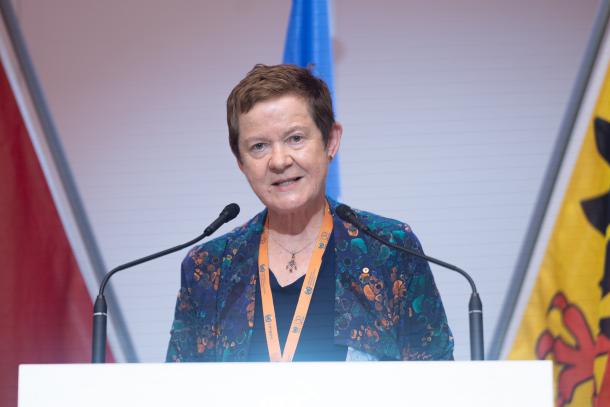Top WMO prize winner Sue Barrell says put people at the centre
Acclaimed Australian scientist Dr Sue Barrell has accepted World Meteorological Organization’s top award at a ceremony which focussed on the need to put people at the centre of policy and services and to accelerate gender equality.
Dr Barrell of Australia won the IMO prize (named after the International Meteorological Organization) for her leadership role in the global weather, water and climate community, for a career of commitment to WMO, and as a role model for female scientists.
“Your dedication to the application of science, technology and data in meteorology and climate science, which you never lost throughout your career, was always very impressive and sets an example for many people,” said WMO President Gerhard Adrian. “The WMO and its community is still profiting from your vision, proficiency, relentless work and dedication,” he said.
Dr Barrell dedicated her award lecture to People.
“As we have expanded the Earth systems concept and embraced the digital era, data-related issues have escalated in importance,” said Dr Barrell, who was instrumental in overhauling and updating WMO’s data policy. “We often talk of data as being the lifeblood of WMO. However, we sometimes forget that the beating heart of WMO is its people and that without them, there would be no data, never mind systems, sharing, collaboration, services, research nor innovation,” she said.
She stressed that people must be at the heart of the UN’s Early Warnings for All initiative.
“As a global WMO community, trusted to monitor, research, understand and predict the state of the Earth system and deliver much needed data, information and services, we know that people are impacted in many ways by weather, water and climate events. We know that the extent of the impact varies depending on many factors, especially their location and their circumstances, and that the people who suffer the worst impacts are, as a rule, the most vulnerable and exposed,” she said.
“Connecting the dots, across the global programs, to a national level and down to the people that need to be informed, alerted, warned, mobilised and kept safe, is an exceedingly important task, and the UN Secretary General’s challenge to WMO reinforces the need to put people not at the end of the line, but at the centre,” said Dr Barrell.
Bureau of Meteorology
Dr Barrell spent her career at the Bureau of Meteorology of Australia. She led major initiatives within WMO and its constituent bodies. Significant achievements have included: the development and implementation of the WMO Integrated Global Observing System (WIGOS); integrating polar and high mountain observations and strategic objectives into WMO’s systems and services as Co-Chair of the WMO Executive Council Panel on Polar and High Mountain Observations, Research and Services (EC-PHORS); and most recently leading the development of the WMO Unified Data Policy.
Dr Barrell holds board and advisory roles across science, technology, and education sectors, is a Fellow of the Australian Academy of Technology and Engineering (ATSE) and was awarded one of Australia’s highest honours for public service, named as an Officer of the Order of Australia in 2022.
Australian ambassador Jeff Roche described her as the “Superstar of STEM (Science, Technology, Engineering and Mathematics).
 Gender Action
Gender Action
“We need to better appreciate the role of people within our integrated Earth system. If we do it right, not only can we build better bridges across and between the full suite of communities and peoples, but we will be better informed, smarter, more inclusive and productive and deliver better and more effective outcomes all around,” said Dr Barrell.
“So, how do we do it better?
“The principles of Equity, Diversity and Inclusion are also not new to anyone here. We call these principles out most often when we talk about engaging more women and other diversity groups spanning gender, disability, cultural, racial, age and regional diversity, into the workforce. It is not about fairness; it is about empowering them, and releasing their potential to play their part in an equitable society,” she said.
She urged the WMO community to accelerate action. This includes nominating more female experts, employing and empowering more women. As an influential driver behind WMO’s updated Gender Action Plan, Dr Barrell provided a list of practical tips and advice on achieving this. She noted that she is only the fourth woman to win the IMO prize.
“The challenge starts at home, and it’s especially timely for Members to accelerate efforts to create the diverse and inclusive workforce needed now and into the future to better serve our shared mission, and to ensure that the information shared with users genuinely reflects their needs. It’s not just about being fair and equitable to everyone; it’s about making the best use of the resources and capability we share to deliver the best outcomes for all,” said Dr Barrell.
Dr Barrell quoted former Chinese leader Mao Zedong when he said that “Women hold up half the sky”.
“It’s about making sure we are indeed holding up the whole sky,” concluded Dr Barrell.

